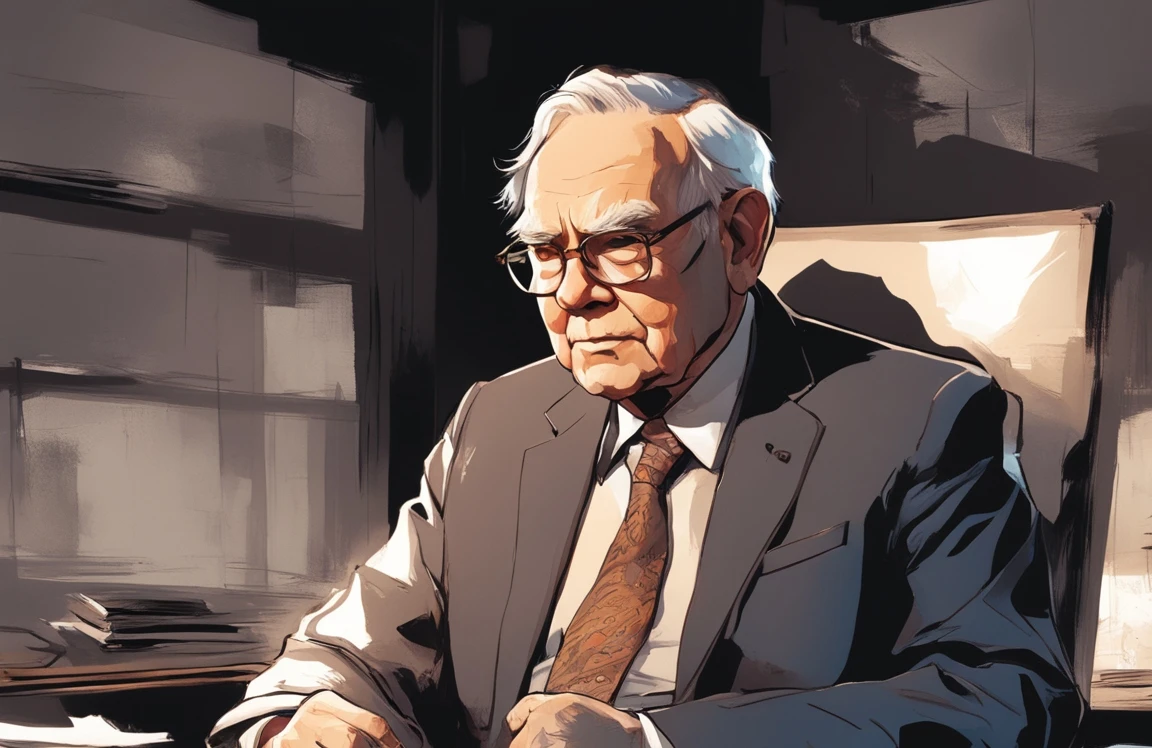Tags: Comments
This fanpage is not officially affiliated with Berkshire Hathaway: Disclaimer
Let us examine the colorful history and strategic potential of The Hartford as a potential acquisition target for Berkshire Hathaway. Discover the financial health, historical significance, and synergies that could drive Berkshire Hathaway's next big move in the insurance sector.

Introduction
In the grand tapestry of corporate America, few threads are as colorful and enduring as Berkshire Hathaway's storied history of acquisitions. Under the astute leadership of Warren Buffett and Charlie Munger↗, Berkshire Hathaway has transformed from a humble textile manufacturing company into a behemoth multinational conglomerate. This transformation has been largely fueled by strategic acquisitions, with Berkshire Hathaway's portfolio now encompassing a diverse range of industries, from insurance and railroads to confectionery and retail. Among the myriad of companies that Berkshire Hathaway has enveloped, insurance companies have always held a place of prominence, with notable names like GEICO and Gen Re bolstering its ranks 1.
It is within this context that The Hartford Financial Services Group, Inc., commonly known as The Hartford, emerges as a potential acquisition target of significant interest. With its rich history dating back to 1810 and its status as the 13th-largest property and casualty insurance company in the United States, The Hartford represents not just a company, but a legacy—one that aligns with Berkshire Hathaway's penchant for acquiring firms with deep historical roots and substantial strategic value 2.
The objective of this article is to delve into The Hartford as a potential acquisition target for Berkshire Hathaway, exploring the financial, historical, and strategic facets that make it an attractive proposition. Through a mix of historical references, financial analysis, and strategic insights, we aim to provide shareholders with a comprehensive understanding of The Hartford's potential fit within Berkshire Hathaway's portfolio. As we navigate through the sections, we will engage in a dialectic discussion on the alignment between The Hartford's offerings and Berkshire Hathaway's acquisition philosophy, promising an enlightening exploration for our readers.
Berkshire Hathaway's Acquisition Philosophy
At the heart of Berkshire Hathaway's acquisition strategy lies a set of criteria that has guided Warren Buffett and Charlie Munger's decisions for decades ↗. Central to this philosophy is the focus on acquiring businesses valued in the $5-20 billion range that boast strong management teams and exhibit potential for long-term growth 6. This approach underscores a preference for substantial, yet manageable investments that promise sustained profitability and strategic advantage.
A distinctive feature of Berkshire Hathaway's acquisition philosophy has always been its preference for cash deals↗, reflecting Buffett and Munger's aversion to leveraging and their commitment to financial stability. Moreover, their approach shuns hostile takeovers, favoring instead a respectful and mutually beneficial engagement with potential acquisition targets. This ethos is encapsulated in the whimsical quote from a country song, "When the phone don't ring, you'll know it's me," humorously illustrating their no-nonsense, straightforward approach to acquisitions 6.
The success stories of GEICO↗ and BNSF Railway↗ serve as prime examples of Berkshire Hathaway's strategic acquisition approach in action. GEICO, acquired in 1996, was recognized by Buffett for its undervalued status and its potential for long-term profitability, thanks to its direct marketing and low-cost operations model. This acquisition has since blossomed into a cornerstone of Berkshire Hathaway's success in the insurance sector 7. Similarly, the acquisition of BNSF Railway in 2010 for $44 billion demonstrated Berkshire Hathaway's strategic intent to invest in industries with significant barriers to entry and long-term growth prospects. BNSF Railway has not only provided Berkshire with a competitive advantage in the transportation industry but has also contributed substantially to its operating income 7.
The Hartford's current market position and financial health appear to align well with Berkshire Hathaway's acquisition criteria. With a market cap of $30.6 billion and a pre-tax income for 2023 projected at approximately $3.1 billion, The Hartford showcases the financial stability and growth potential that Berkshire Hathaway values 5. Additionally, The Hartford's insurance float, estimated in the range of $30 - $40 billion, presents an attractive opportunity for Berkshire Hathaway, which has historically leveraged insurance floats to fund investments across its portfolio 1.
In sum, Berkshire Hathaway's acquisition philosophy is characterized by a discerning eye for value, a preference for cash deals, and a strategic focus on long-term growth and financial stability. As we explore The Hartford's financial health and strategic significance in the following sections, it becomes evident that this potential acquisition could very well embody these principles, marking yet another strategic move in Berkshire Hathaway's illustrious history.
The Hartford's Financial Health
The Hartford, a stalwart in the insurance industry, has recently unveiled its financial results for the fourth quarter and the full year of 2023, presenting a robust picture of its financial health that could potentially catch the eye of conglomerates like Berkshire Hathaway. The Hartford reported a net income available to common stockholders of $766 million ($2.51 per diluted share) in the fourth quarter, marking a 30% increase from 2022, and a full-year net income of $2.5 billion ($7.97 per diluted share) 3. Such figures not only reflect a solid financial standing but also an upward trajectory in profitability.
A closer look at The Hartford's dividend history reveals a consistent pattern of financial stability and growth. The company has been recognized as a dividend achiever, having increased its dividend each year since 2009. With a 12-month trailing dividend yield of 1.83% and a forward dividend yield of 1.97%, The Hartford demonstrates a commendable balance between rewarding shareholders and reinvesting in its operations 4. This is further supported by a dividend payout ratio of 0.20 as of December 31, 2023, indicating a healthy balance between distributing profits and retaining funds for future growth.
The Hartford's market capitalization stands at $30.6 billion, with a current stock price of 103.05 USD as of the close of March 28, 2023. This valuation, coupled with a 52-week range of 67.01 - 103.27 USD, underscores the company's financial resilience and growth potential 5. When considering Berkshire Hathaway's acquisition criteria, The Hartford's pre-tax income of approximately 3.1 billion USD for 2023 and an insurance float in the range of $30-40 billion align well with Berkshire's strategic investment in insurance operations 56.
Analyzing The Hartford's profitability and growth ranks, the company boasts strong revenue and EPS growth rates, with a profitability rank of 7 out of 10 and a growth rank also at 7 out of 10 as of December 31, 2023. Such metrics not only highlight The Hartford's robust financial health but also its potential for sustained growth 4. The company's commercial and personal lines have shown impressive premium growth, with commercial lines and personal lines growing by 9% and 12%, respectively, in the fourth quarter of 2023. This growth in premiums further solidifies The Hartford's market position and growth potential, making it an attractive target for Berkshire Hathaway's insurance portfolio 3.
Historical and Strategic Significance
The Hartford's storied history, dating back to its founding in 1810, is a testament to its enduring presence and significance in the American business landscape. The company has been at the forefront of several historical milestones, including issuing the first insurance policy for Yale University in 1825, providing protection for Abraham Lincoln's home in 1861, and paying over $11 million in damage claims after the 1906 San Francisco earthquake and fire 8. Such historical significance not only underscores The Hartford's resilience and reliability but also aligns with Berkshire Hathaway's appreciation for companies with a long-standing legacy and proven track record.
Moreover, The Hartford's commitment to ethics and compliance has been recognized with its 15th designation as one of the World’s Most Ethical Companies® by Ethisphere 9. This recognition highlights The Hartford's culture of integrity, driven by strong ethics, governance, and compliance programs, which aligns with Berkshire Hathaway's own ethical standards and community-focused values.
The potential for synergy between The Hartford's operations and Berkshire Hathaway's existing insurance businesses is significant. The Hartford's extensive experience and reputation in the insurance industry could complement Berkshire's portfolio, offering diversification and strengthening its market position. Additionally, The Hartford's strategic initiatives, such as the Junior Fire Marshal program and partnerships with AARP, demonstrate a community-focused approach that resonates with Berkshire Hathaway's values.
The historical and strategic significance of The Hartford, combined with its robust financial health, makes it an attractive target for Berkshire Hathaway. The potential for synergy, coupled with The Hartford's long-standing legacy and commitment to ethics, aligns well with Berkshire's acquisition philosophy and strategic objectives. As Berkshire Hathaway continues to explore opportunities to expand its insurance operations, The Hartford stands out as a compelling candidate that could contribute to Berkshire's long-term growth and success in the insurance sector.
Market Capitalization vs. Earnings Analysis
In the intricate chess game of corporate acquisitions, Berkshire Hathaway, under the strategic vision of Warren Buffett, has positioned itself as a formidable player. The potential acquisition of The Hartford Financial Services Group, Inc. (HIG) presents a fascinating case study in the alignment of market capitalization with corporate earnings, a critical metric in Berkshire Hathaway's acquisition philosophy.
The Hartford boasts a market capitalization of $30.6 billion, with its stock price closing at $103.05 as of the close of March 28, 2023 5. This valuation comes on the back of a robust financial performance, with pre-tax income rising from $2.2 billion in 2022 to an estimated $3.1 billion in 2023 5. This upward trajectory in earnings, juxtaposed with the company's market capitalization, signals a healthy financial health and growth potential that aligns with Berkshire Hathaway's acquisition criteria, which emphasizes value and long-term growth 6.
The Hartford's current valuation, when dissected through the lens of its earnings, suggests that it could be an attractive acquisition target for Berkshire Hathaway. The conglomerate's history of acquisitions reveals a pattern of strategic investments in companies with strong fundamentals and undervalued market positions 7. The Hartford's financial health, coupled with its market position, makes it a compelling case for acquisition, potentially offering Berkshire Hathaway a strategic advantage in the insurance sector, bolstering its earnings and market position.
However, the broader economic and market conditions, including interest rates and regulatory environments, play a crucial role in the timing and feasibility of such a strategic move. Berkshire Hathaway's historical acquisition costs and outcomes offer a blueprint for evaluating the potential cost and benefits of acquiring The Hartford. The conglomerate's successful acquisition of GEICO in 1996, for instance, showcases the long-term value such strategic moves can bring, suggesting a promising outlook for The Hartford's integration into Berkshire Hathaway's portfolio 7.
The Role of Insurance Float
At the heart of Berkshire Hathaway's investment strategy lies the concept of insurance float ↗. This financial metric, representing the funds an insurer collects from premiums, which are not needed to pay claims immediately, offers a low-cost, or even cost-free, capital that can be invested for the company's benefit. Berkshire Hathaway, with its substantial insurance operations, has masterfully leveraged its float to fuel its investment strategy, making acquisitions and significant investments 1.
The Hartford's insurance float, estimated to be in the range of $30 to $40 billion, represents a significant pool of capital that could enhance Berkshire Hathaway's already substantial float 5. The strategic acquisition of The Hartford could, therefore, not only expand Berkshire Hathaway's insurance operations but also substantially increase its float, bolstering its capacity to make further investments and acquisitions.
Comparing The Hartford's float with that of Berkshire Hathaway's reveals the potential for a strategic enhancement of Berkshire Hathaway's investment capacity. At the end of 2023, Berkshire Hathaway's insurance float amounted to almost $170 billion ↗. The addition of The Hartford's float could provide Berkshire Hathaway with additional financial leverage, enabling it to pursue larger and potentially more lucrative investment opportunities 1. The combined ~$200 billion float wouldn't be too bad after all!
However, integrating The Hartford's float with Berkshire Hathaway's existing operations presents potential challenges, including regulatory hurdles and the need for strategic alignment. Past instances, such as the acquisition of BNSF Railway, demonstrate Berkshire Hathaway's ability to successfully leverage acquired floats to fund substantial investments, suggesting a promising precedent for the integration of The Hartford's float 7.
Hence, the acquisition of The Hartford by Berkshire Hathaway could represent a strategic enhancement of Berkshire Hathaway's market position and investment capacity ↗. The alignment of The Hartford's market capitalization with its earnings presents a compelling case for its acquisition, while the potential addition of The Hartford's insurance float could significantly bolster Berkshire Hathaway's ability to pursue its investment strategy. As with all strategic moves, the success of such an acquisition would depend on the meticulous integration of The Hartford's operations and float with Berkshire Hathaway's existing portfolio, a challenge that the conglomerate has successfully navigated in the past.
Potential Synergies and Strategic Fit
The potential acquisition of The Hartford by Berkshire Hathaway could represent a strategic masterstroke, enhancing the conglomerate's already formidable presence in the insurance industry. With Berkshire Hathaway's vast experience and The Hartford's established market position, the synergies and strategic fit between the two entities appear both compelling and multifaceted.
Firstly, The Hartford's business lines, notably in property and casualty insurance, group benefits, and mutual funds, offer a complementary expansion to Berkshire Hathaway's existing insurance operations, including giants like GEICO and Gen Re 13. This complementarity could enable Berkshire to offer a more diversified product portfolio, catering to a broader customer base.
Analyzing potential synergies, the integration of The Hartford with Berkshire Hathaway's insurance subsidiaries could lead to significant operational efficiencies. Both companies have a strong focus on underwriting discipline, which could be further optimized through shared best practices and resources. Moreover, The Hartford's strong commercial lines and personal lines premium growth could be leveraged across Berkshire Hathaway's vast network, enhancing cross-promotion opportunities and potentially boosting overall sales 2.
The strategic fit of The Hartford within Berkshire Hathaway's broader portfolio cannot be overstated. The acquisition would not only solidify Berkshire's position in the insurance sector but also contribute to sector diversification and risk management 7. Given Berkshire's history of successful acquisitions and the hands-off management approach that respects the autonomy of acquired companies, The Hartford's integration could be seamless, preserving its operational integrity while benefiting from Berkshire's financial strength and strategic guidance.
Furthermore, the cultural fit between The Hartford and Berkshire Hathaway, particularly their shared values of ethics, integrity, and a long-term focus, underscores the potential for a harmonious integration. The Hartford's recognition as one of the World’s Most Ethical Companies® aligns with Berkshire Hathaway's ethical business practices, promising a united front in corporate governance and customer relations 9.
In terms of competitive advantage, the acquisition could significantly bolster Berkshire Hathaway's positioning in the insurance market. By harnessing The Hartford's established brand, customer base, and product offerings, Berkshire could enhance its market share and influence, further distancing itself from competitors.
Challenges and Considerations
However, the possible path to successfully acquiring and further integrating (if necessary) The Hartford is not without its challenges and considerations. Firstly, potential regulatory challenges and antitrust considerations could pose significant hurdles. Given the size and market influence of both companies, regulatory bodies may scrutinize the acquisition closely, requiring careful navigation and compliance strategies 7.
Integration challenges, including cultural differences and operational alignment, also merit attention. While both companies share similar values, the practical aspects of merging operations, systems, and corporate cultures could prove complex. Ensuring a smooth transition for employees, maintaining operational efficiency, and integrating corporate strategies would be critical for success 7.
The financial implications of the acquisition, particularly regarding Berkshire Hathaway's financial leverage and liquidity, must be carefully weighed. While Berkshire is known for its significant cash reserves, the acquisition's financing terms and the potential impact on Berkshire's balance sheet warrant thorough analysis. Overpaying for The Hartford, given its current market valuation, could also pose a risk, necessitating a careful assessment of the price relative to the company's intrinsic value 56.
Stakeholder reactions, including those from The Hartford's employees, customers, and shareholders, would also play a crucial role in the acquisition's success. Addressing concerns, ensuring transparency, and demonstrating the mutual benefits of the acquisition would be essential in garnering support.
Lastly, broader economic and market conditions could influence the acquisition's timing and success. Market volatility, economic downturns, or changes in the regulatory environment could all impact the strategic rationale and financial outcomes of the deal.
The big question is of course if the intrinsic value for The Hartford as a Berkshire Hathaway subsidiary would be significantly larger than possible acquisition costs in excess of $30 billion.
In navigating these challenges, the wisdom and experience of Warren Buffett and Ajit Jain would be invaluable. Their track record of addressing challenges and risks in past acquisitions, combined with a strategic, long-term focus, suggests a cautious yet optimistic approach to overcoming potential hurdles with The Hartford 6.
While the acquisition of The Hartford by Berkshire Hathaway presents a compelling strategic opportunity with significant potential synergies, it also requires careful consideration of various challenges and risks. The success of this strategic move would depend on meticulous planning, strategic foresight, and the effective navigation of regulatory, financial, and operational hurdles.

Conclusion
The potential acquisition of The Hartford by Berkshire Hathaway represents a strategic opportunity that aligns well with Berkshire Hathaway's acquisition philosophy and strategic objectives. The financial health, historical significance, and potential synergies between the two companies make The Hartford a compelling target for Berkshire Hathaway's expansion in the insurance sector. The robust financial performance of The Hartford, coupled with its market capitalization and earnings growth, presents a strong case for acquisition, promising long-term value creation and growth potential for Berkshire Hathaway 35.
The historical legacy and ethical culture of The Hartford, combined with Berkshire Hathaway's track record of successful acquisitions and ethical business practices, suggest a harmonious fit that could benefit both companies and their stakeholders 89 ↗. The potential integration of The Hartford's operations and insurance float with Berkshire Hathaway's existing portfolio offers significant opportunities for operational efficiencies, market expansion, and investment capacity 1.
However, the acquisition also poses challenges and considerations, including regulatory hurdles, integration complexities, financial implications, and stakeholder reactions. Navigating these challenges would require careful planning, strategic foresight, and the expertise of Warren Buffett and Ajit Jain to ensure a successful outcome 67.
For Berkshire Hathaway shareholders, the potential acquisition of The Hartford holds the promise of long-term growth, value creation, and strategic advantage in the insurance sector. By considering the analysis presented in this article and engaging in further discussion and analysis, shareholders can gain a deeper understanding of Berkshire Hathaway's strategic direction and investment philosophy, contributing to informed decision-making and a shared vision for the future.
Overall, the acquisition of The Hartford by Berkshire Hathaway has the potential to enhance Berkshire Hathaway's market position, strengthen its insurance operations, and contribute to its overall success. As shareholders continue to monitor developments and assess the implications of this strategic move, they are encouraged to reflect on the strategic alignment, financial health, and potential synergies that make The Hartford an attractive acquisition target. By embracing a thoughtful and strategic approach, Berkshire Hathaway and its shareholders can navigate the complexities of the acquisition landscape and pave the way for sustained growth and value creation in the years to come.
References
-
The Hartford - Wikipedia - en.wikipedia.org ↩↩
-
The Hartford Announces Outstanding Fourth Quarter And Full Year 2023 Financial Results - ir.thehartford.com ↩↩↩↩
-
The Hartford Financial Services Group Inc's Dividend Analysis - finance.yahoo.com ↩↩
-
The Hartford Financial Services Group, Inc. (HIG) Stock Price, News, Quote & History - Yahoo Finance - finance.yahoo.com ↩↩↩↩↩↩↩↩
-
Growth through Acquisitions: Berkshire Hathaway's Expansion Strategy - FasterCapital - fastercapital.com ↩↩↩↩↩↩↩↩↩
-
Our History - www.thehartford.com ↩↩
-
The Hartford Named One Of ‘World’s Most Ethical Companies’ For 15th Time by Ethisphere - newsroom.thehartford.com ↩↩↩












